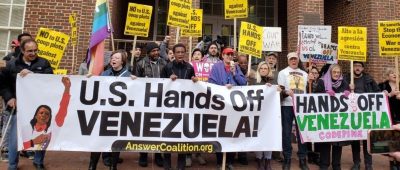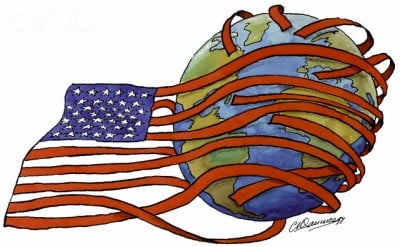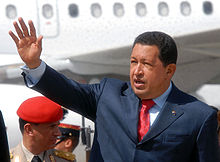By Nurah Tape – The Palestine Chronicle
“The basic steps of this action plan is 15th of May is a special day of commemoration of all victims of Palestinians from 1948 until today. And Nakba is continuing today as well.”
Former Turkish Prime Minister Ahmet Davutoğlu has made a formal plea to world leaders to declare May 15 a day of global mourning to mark the Nakba or Great Catastrophe when the creation of Israel in 1948 led to the mass ethnic cleansing of Palestine.
“The flags must be lowered and there should be one day of mourning everywhere in the world. Secondly, we are calling them to organize a UN General Assembly meeting, summit level, not ambassador level, summit level,” Davutoğlu told The Palestine Chronicle on the sidelines of the first Global Anti-Apartheid Conference on Palestine held in Johannesburg from May 10 – 12.
He explained that last November, a group of 139 intellectuals, former statesmen and Nobel Prize winners met “to defend Palestinians against genocide in Gaza.”
Amongst the participants were Richard Falk, former UN Special Rapporteur on the Situation of Human Rights in the occupied Palestinian Territories; Professor Noura Erakat, human rights attorney; and Mairead Maguire, Nobel Peace Laureate (1976), and Member of Russell Tribunal, Northern Ireland.
The meeting resulted in the Declaration of Global Conscience established in December, and a call was made to world leaders.
“I declared this in (the) Turkish Parliament” last month, Davutoğlu said. “The basic steps of this action plan is 15th of May is a special day of commemoration of all victims of Palestinians from 1948 until today. And Nakba is continuing today as well.”
He added: “So we are making a call to world leaders that this day should be accepted as a day of global mourning in all the countries who supported Gazan people against genocide.”
UN General Assembly Summit
Davutoğlu, who is also the former Turkish Foreign Minister, said: “All the leaders supporting Palestine, they should go to UN General Assembly summit 15th of May.”
Letters, he explained, were sent “to almost all the leaders, President Ramaphosa, President Lula, leaders of all pro-Palestinian as well as UN Security Council members. Colombia, Bolivia, Chile, Algeria, Russia, China, many of them.”
In this UN General Assembly meeting, at summit level, “a resolution should be taken to mandate UNICEF to take care of children in Gaza, to mandate World Health Organization to take care of health services in Gaza, mandating UNHCR refugees, UN High Commission for Refugees to take care of refugees in and out Gaza, and UNHCR Human Rights Council to take (a) stand regarding human rights violations in Gaza.”
Roadmap to Solidarity – Johannesburg Declaration Vows to Dismantle Israel’s Settler-Colonialism
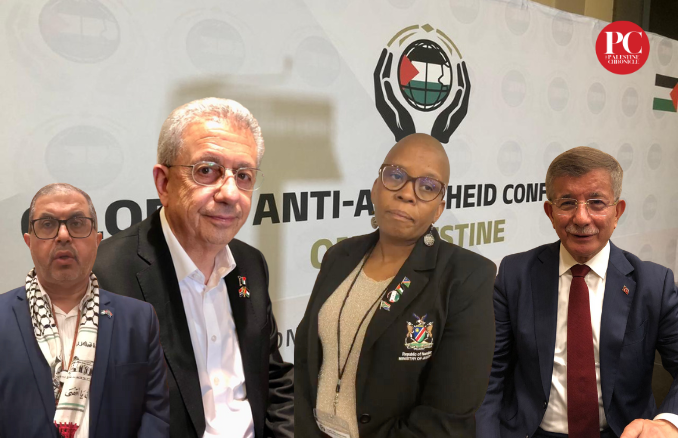
By Nurah Tape – The Palestine Chronicle The delegates vowed, “to ensure Israel and those complicit in its genocide are held accountable (and) to support the struggle for the liberation of the Palestinian people.” … Continue readingRoadmap to Solidarity – Johannesburg Declaration Vows to Dismantle Israel’s Settler-Colonialism Palestine Chronicle
The World FAO, Food and Agriculture Organization, he added, could prepare a report on famine and food shortage in Gaza.
“Such a meeting, global level, would change the situation on the ground,” he stressed. “In the same UN General Assembly meeting, a delegation should be formed to be sent to Gaza to prepare a report and a working team could be established on the ground.”
Davutoğlu stated: “So this is basically our initiative and I hope there will be some leadership to bring this to (the) UN platform. We wrote these letters to secretaries, generals of OIC, Arab League, UN as well, and 15th of May should not be a day of commemoration in an ordinary way this year. There should be a special action plan for Nakba Day.”
‘Issue of Humanity’
Asked whether the Turkish government is participating in this initiative, Davutoğlu said he had sent a letter to President Recep Tayyip Erdogan, adding “I made a call to him as well.”
He said he also spoke to Hakan Fidan, the Minister of Foreign Affairs.
The former chief advisor to Erdogan, said that in the first week following Israel’s launch of its military assault on the Gaza Strip, he had called for the government to “stop all trade” with Tel Aviv, “to ban Turkish airspace for Israeli flights, and to have an active position stand to apply to the ICJ.”
“Unfortunately, Turkiye didn’t do it and fortunately, South Africa did,” he said.
“For me, this is not a Turkish issue, this is not an Arab issue, this is not even just a Muslim issue, this is an issue of humanity. Those who are supporting Gaza and Palestine, they are supporting human values.”
‘The Nakba is Now Ours’ – What is the Palestinian Nakba Day? Why It Matters

By Palestine Chronicle Staff On Wednesday, May 15, Palestinians around the world are marking the 76th anniversary of the Nakba of 1948. What is the Nakba? Nakba Day is commemorated every year on May … Continue reading‘The Nakba is Now Ours’ – What is the Palestinian Nakba Day? Why It Matters Palestine Chronicle
Johannesburg Declaration
Davutoğlu was one of the keynote speakers at the conference attended by delegates from more than a dozen countries which aimed “to set the basis for the mobilisation of a Global Anti-Apartheid Movement to hold Israel accountable for its crimes against the Palestinian people, and to work to dismantle Israeli apartheid.”
The Johannesburg Declaration on Israel’s Settler-Colonialism, Apartheid and Genocide, was issued at the conclusion of the conference on Sunday.
It declared that “The war prosecuted for decades by Israel and its genocidal enablers is not only against the Palestinian people, it is against humanity as a whole.”
The Declaration called “for the immediate release of all Palestinian political prisoners, detainees and hostages, and demand an end to arbitrary arrest, administrative detention, abductions, and torture of prisoners.”
This is Palestine’s Anti-apartheid Moment – Linda Sarsour (VIDEO)

By Nurah Tape – The Palestine Chronicle “I do feel that Palestine is having our South African anti-apartheid moment.” Palestinian-American political activist Linda Sarsour has said that the rhetorical shifts from the US administration … Continue readingThis is Palestine’s Anti-apartheid Moment – Linda Sarsour (VIDEO) Palestine Chronicle
‘Isolate Apartheid Israel’
It condemned governments “that have enabled or been complicit with the Zionist project, which – from Balfour to Biden – remain complicit even as Israel perpetrates a genocide and violates international law with impunity.”
“We are committed to isolate apartheid Israel by intensifying consumer, academic, sports, arts, and cultural boycotts and escalating the campaign for economic and financial sanctions,” it stated.
The movement will “prioritize blocking its shipping routes, campaigning for an arms embargo against Israel, targeting those supporting, funding, supplying weapons to and joining the Israeli Occupation Forces, and expelling Israel from international sporting, cultural and academic bodies.”
Palestinians are Making Their Own Future through Resistance – Dr. Mustafa Barghouti (VIDEO)
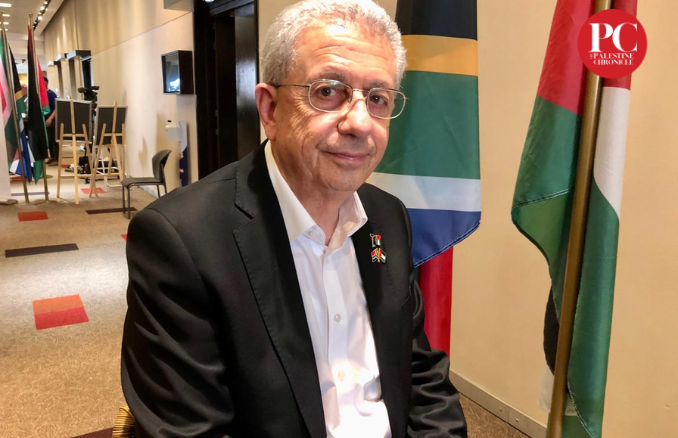
By Nurah Tape – The Palestine Chronicle “We will not be able to have true freedom and true peace without the complete dismantlement of the settler colonial system in Palestine.” Palestinian Legislative Council member … Continue readingPalestinians are Making Their Own Future through Resistance – Dr. Mustafa Barghouti (VIDEO) Palestine Chronicle
Over 35,000 Killed
According to Gaza’s Ministry of Health, 35,233 Palestinians have been killed, and 79,141 wounded in Israel’s ongoing genocide in Gaza starting on October 7.
Moreover, at least 11,000 people are unaccounted for, presumed dead under the rubble of their homes throughout the Strip.
Palestinian and international organizations say that the majority of those killed and wounded are women and children.
The Israeli war has resulted in an acute famine, mostly in northern Gaza, resulting in the death of many Palestinians, mostly children.
The Israeli aggression has also resulted in the forceful displacement of nearly two million people from all over the Gaza Strip, with the vast majority of the displaced forced into the densely crowded southern city of Rafah near the border with Egypt – in what has become Palestine’s largest mass exodus since the 1948 Nakba.
Israel says that 1,200 soldiers and civilians were killed during the Al-Aqsa Flood Operation on October 7. Israeli media published reports suggesting that many Israelis were killed on that day by ‘friendly fire’.
(The Palestine Chronicle)

– Nurah Tape is a South Africa-based journalist. She is an editor with The Palestine Chronicle.

Donate NOW Learn More Watch Video(The Palestine Chronicle is a registered 501(c)3 organization, thus, all donations are tax deductible.)
- ‘For How Long?’ – China Says Nakba’s ‘Historical Injustice’ has Further Worsened
- ‘Before the End of the Month’ – Ireland to Recognize Palestinian State
- ‘Not A Genocide’ – White House to Proceed With $1 Billion Arms Supply to Israel
- Meetings on Disclosure, Divestment – Harvard Students Reach Agreement to End Encampment
- ‘Declare May 15 Day of Mourning’ – Former Turkish Prime Minister Davutoğlu Urges World Leaders
- ‘Kill ‘Em All’ – US Politicians And Their Genocidal Comments against Palestinian since October 7
- Al-Qassam Kills 12 Occupation Soldiers, as Army Retreats from Zaytoun – BREAKING
- ‘The Nakba is Now Ours’ – What is the Palestinian Nakba Day? Why It Matters
- Ongoing Nakba – Scores Killed, Wounded as Israel Intensifies Raids across Gaza
- GAZA LIVE BLOG: 12 Soldiers Killed | Nakba Day in Palestine | Army Retreats from Zaytoun | Massacres in Jabaliya – Day 222
Filed under: "Israel", Algeria, China, Palestine, Palestinian people, Russia, UNICEF | Tagged: 1948 Nakba Day, Anglozionist Genocidal War on Gaza, Apartheid Israel, Arab League, Bolivia, Brazilian President Lula da Silva, Chili, Colombia, Ethnic Cleansing, Former Turkish Prime Minister, Global Anti-Apartheid Movement, International Court of Justice ICJ, Israeli Occupation Force IOF, Palestine Chronicle, Rafah Invasion, Richard Falk, The death toll in Gaza, The Organisation of Islamic Cooperation (OIC), United Nations Food and Agriculture Organization FAO, Zionist settler-colonialism | 1 Comment »



















